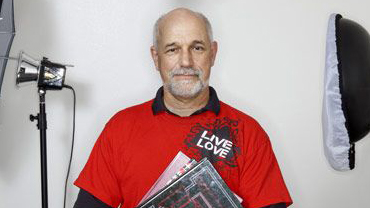An American Honor Killing
In a quiet suburban parking lot outside of Phoenix, a father floors the gas on his Jeep Grand Cherokee and heads straight for his 20-year-old daughter. His goal: to protect his family's "honor." Yes, honor crimes have washed up on our shores.

Select the newsletters you’d like to receive. Then, add your email to sign up.
You are now subscribed
Your newsletter sign-up was successful
Want to add more newsletters?

Delivered daily
Marie Claire Daily
Get exclusive access to fashion and beauty trends, hot-off-the-press celebrity news, and more.

Sent weekly on Saturday
Marie Claire Self Checkout
Exclusive access to expert shopping and styling advice from Nikki Ogunnaike, Marie Claire's editor-in-chief.

Once a week
Maire Claire Face Forward
Insider tips and recommendations for skin, hair, makeup, nails and more from Hannah Baxter, Marie Claire's beauty director.

Once a week
Livingetc
Your shortcut to the now and the next in contemporary home decoration, from designing a fashion-forward kitchen to decoding color schemes, and the latest interiors trends.

Delivered Daily
Homes & Gardens
The ultimate interior design resource from the world's leading experts - discover inspiring decorating ideas, color scheming know-how, garden inspiration and shopping expertise.
Around the sprawling, sunbaked campus of Dysart High School in El Mirage, Arizona, not many people knew about the double life of a pretty, dark-haired girl named Noor Almaleki.
At school, she was known as a fun-loving student who made friends easily. She played tennis in a T-shirt emblazoned with the school mascot — a baby demon in a diaper. She liked to watch Heroes and eat at Chipotle. Sometimes she talked in a goofy Keanu Reeves voice. She wore dark jeans, jeweled sandals, and flowy tops from Forever 21. She texted constantly and called her friends "dude." In other words, she was an American girl much like any other.
But at home, Noor inhabited a darker world. She lived a life of subservience, often left to care for her six younger siblings. Noor's father, 49-year-old Faleh Almaleki, was strict and domineering, deeming it inappropriate for her to socialize with guys, wear jeans, or post snapshots of herself on MySpace. Her responsibility was to follow orders, or to risk a beating. From her father's perspective, the only time Noor's life would ever change would be when she married a man he selected for her — back in his homeland of Iraq. Noor, however, had a different vision for herself. Having lived in the U.S. for 16 years, she held dreams of becoming a teacher, of marrying a man she loved, and, most importantly, of making her own choices.
On a cloudless, breezy afternoon in late October 2009, her father set out to end those dreams. As Noor walked across a suburban parking lot to a Mexican restaurant with a friend — a 43-year-old woman named Amal Khalaf — Faleh Almaleki gunned the engine of his Jeep Grand Cherokee and bore down on his 20-year-old daughter and her companion. The women took off running but were no match for the SUV, already traveling close to 30 miles per hour. Suddenly Amal turned, held up her hands in a futile attempt to stop the Jeep, and froze. Moments later, the vehicle struck the women, tossing them into the air. Amal hit the pavement; Noor landed on a raised median, in a patch of pebbly landscaping. Faleh wasn't done, though. Swerving onto the median, he ran over his daughter as she lay bleeding, fracturing her face and spine. Then, he reversed and sped away.
Passersby heard the roar of the engine, screams, the impact of the bodies as they hit the Jeep's grill. They saw the women lying on the ground, their sandals scattered across the lot. A witness called 911, and emergency vehicles converged. Amal's condition was stable; Noor was comatose.
Local police characterized the incident as an attempted "honor killing" — the murder of a woman for behaving in a way that "shames" her family. It's a practice with deep, tenacious roots in the tribal traditions of the Middle East and Asia. (The United Nations estimates that 5,000 women die annually from such crimes.) Women are stoned, stabbed, and, in the recent case of a teenage girl in Turkey, tied up and buried alive. But honor killings in America are a chilling new trend. In Texas, teen sisters Amina and Sarah Said were shot dead in 2008, allegedly by their father, because they had boyfriends. That same year in Georgia, 25-year-old Sandeela Kanwal was allegedly strangled by her father for wanting to leave an arranged marriage. Last year in New York, Aasiya Hassan, 37, was murdered in perhaps the most gruesome way imaginable: She was beheaded, allegedly by her husband, for reportedly seeking a divorce. And this past spring, 19-year-old Tawana Thompson's husband gunned her down in Illinois, reportedly following arguments about her American-style clothing.

Amazingly, honor killings in the U.S. have been largely ignored by the national media. That's because these incidents are typically dismissed as "domestic" in nature — a class of crime that rarely makes the headlines. Since the murderer is a member of the woman's family, there's no extended investigation to capture the public's attention. Also, the family of the perpetrator rarely advocates for the victim, due to either fear or a belief that the woman got what she deserved. "From the family's point of view, if the goal is to end rumors about their female relative, the last thing they want is to have the press talk about the case," says Rana Husseini, a human-rights activist and author of Murder in the Name of Honor. Still, the lack of media coverage or public outcry cannot erase the evidence: Honor killings have washed up on our shores.
Get exclusive access to fashion and beauty trends, hot-off-the-press celebrity news, and more.
While there's little doubt that what Noor endured can only be classified as an "honor crime," the characterization brings up strong emotions in her closest friends. "Noor did nothing dishonorable!" insists Adhikar Dhakal. Appalled by his friend's fate and determined that no other American girl should face the same situation, he and others have established a Facebook group devoted to Noor, with nearly 4,000 members. Every day people post messages of outrage and support, making the fight against honor crimes a growing movement in this country, with increasingly passionate followers.
For her part, Noor has come to represent the profound complexities faced by young women with one foot in suburban America, the other in Middle Eastern tradition. This past spring, I traveled to Arizona in an effort to shed light on why a father would try to kill his own daughter for being too American — a father who, in the case of Faleh Almaleki, had recently become a U.S. citizen himself.
It's a crisp, sunny morning in March when I arrive in Glendale, the Phoenix suburb where Noor grew up. Local newscasts are taken up with the story of two women who were attacked by a swarm of bees. A memorial service is being held for hometown hero Lori Piestewa, a Native American who was killed at the start of the war in Iraq. The air is sweet with the smell of orange trees, now in full bloom.
Noor's friends aren't too eager to talk to me. I'm not surprised. Although honor crimes aren't officially sanctioned by Islam, they're associated with predominantly Muslim countries, and there's concern that any discussion of them will prove inflammatory, even dangerous. Noor's closest friends, I learn, are also angry at the press over local news items containing misinformation about Noor. Several reports said she wanted to be a model; others said she'd moved in with her boyfriend. In fact, the truth about Noor is far more poignant.
At Dysart High School, Noor's photography teacher, Jim Heinrich, stands beside a poster of his classroom rules (No. 1: Wonder a lot!). The school's population of 1,700 students is like a United Nations: Mexican, Pakistani, Iraqi. "Students rarely bring who they are at home into the classroom," he tells me. He describes Noor as "quiet, funny, and productive" in class.
Mary Ancell, who ran the school bookstore where Noor worked, remembers laughing with her on the job. "One day we were working on the computer and she mistakenly deleted herself from the school system," she says. "But we got her back the next day." Then she pauses, and begins to cry.
Leilani Llewellyn, a high school friend, says she and Noor would sit in history class and chat — about guys, clothes, music, whatever. Noor liked the bands Oasis and Rise Against; the Snoop Dogg song "Ballin'" made her laugh. Jeffrey Peck, another friend, says Noor helped him through some "tough times" with his girlfriend in high school, but didn't talk about her own problems.
Susan Poland, who runs the school's Key Club, a community-service program, recalls that Noor would hint at threats from her father to send her back to Iraq (where, he said, she would "learn to be a good girl"), but no one really took him seriously. In the winter of 2007, however, during Noor's senior year, her father made good on his threats, taking her out of school for a trip to his homeland.
Noor's friends have different versions of what transpired, but it's clear that marriage was on the agenda. Friends say her father had had enough of Noor asserting her independence and talking to American guys, so he and her mother tricked her into traveling to Iraq, telling her they needed to visit a sick relative. Only upon arrival did Noor learn of the real reason for their trip: to marry her off.

It's unclear whether a wedding actually took place. Some friends say she only attended an engagement ceremony; others tell me they believe she did get married, albeit against her will. Still others say Noor was given a choice of five brothers, but her parents didn't like the one she chose, so the wedding was called off. Noor's parents, in police documents, maintain that a marriage did, in fact, occur. Whatever the case, Noor returned to Arizona a few months later without a husband, and moved back in with her family. She missed her younger siblings, friends say, and her parents needed help caring for them.
The Almaleki home is located in a Phoenix subdivision called Paradise Views. It's a comfortable-looking place that suggests the family was at least making a go of the more tangible aspects of the American dream. Although unemployed at the time of the parking-lot incident, and with a purported gambling habit, Noor's father had previously found work as a truck driver. Noor's mother had been hired by a company in California to help prepare American soldiers for cultural differences they would face in the Middle East — an incongruous career path, given her struggle at home to perform such a role in her own daughter's life. On the day I visit, the blinds are drawn. It's a Sunday and the neighborhood is silent. Palm trees and fuchsia flowers line the streets; in the distance, blue-gray mountains loom.
In the months after Noor's return from Iraq, the mood in the Almaleki household was heavy with tension. Noor dutifully looked after her siblings and completed the schoolwork necessary for her high school diploma, but by May 2008, the family was in full crisis. Noor's father had found a photo of her with male friends on MySpace, and he didn't like it. The situation became so heated that she started talking about moving out. One day, when Noor took the family car to visit a cousin, her father reported it stolen. When she learned what he'd done, she left the car on the side of the road and walked away. According to police records, her father wanted to file criminal charges against Noor to "teach her a lesson," telling police she was "disgracing the family" and that it didn't "look good" that she was moving out. Eventually she did move in with a friend. But after repeated run-ins with her father, and after learning that her mother was casting "spells" on her host family, she gave up and returned home.
Noor's 20th birthday, in February 2009, became a breaking point. After another family fight — this one in the middle of the night — she phoned a friend to come and get her. The friend, who asked not to be identified, describes a tumultuous scene: Noor came running out the door wearing her pajamas and carrying a purse — and, oddly, a roll of gift wrap. As her father chased her across the lawn, Noor jumped into the backseat, and the friend raced away.
A few minutes later, the girls met up with another friend in the parking lot of the local Westgate Mall. There, all three in their pajamas, they leaned against their cars and burst out laughing at the absurdity of the situation. "I asked her what was up with that gift wrap," Noor's friend recalls. "She laughed and said, 'I don't know. I just had it in my hand!'" That night, Noor moved in with the friend who had picked her up, ultimately enlisting the police to protect her as she retrieved her things from the family home. "She loved that," her friend tells me. "The police helped her out."
And in the spring of 2009, Noor got her own apartment. Her friends helped her furnish it with a new mirror and a cloudy TV they found on Craigslist for $25. The next few weeks brought happier times. "We rented videos at midnight wearing zit cream," one of her friends tells me, smiling. "We drank more Mocha Joes from Burger King than water." To pay the rent, Noor worked at a local Chipotle; she'd also begun attending Glendale Community College.
I meet Noor's close friend Adhikar Dhakal at that same Chipotle. A thoughtful, handsome student at Arizona State University, Adhikar reminisces about how Noor hated the brown cap she had to wear as an employee at the restaurant. He smiles at the memory. Noor worked hard to support herself, he says, noting that she sent photos to a couple talent agencies to try to earn money, possibly as an extra on a movie set— but not, as the local press reported, to become a model. He calls Noor "the most perfect person" he has ever known.
When Noor's parents learned where she was working, they started showing up and insisting that she move back home, so she got a job across town, as a hostess at Applebee's. They turned up there too, leaving her no choice but to abandon that job as well. With no source of income, she was forced to return home once more.

The final blowup came that summer. In June 2009, longtime family friend Amal Khalaf awoke to find Noor sleeping in the family's van, parked in the driveway. Noor said her parents had hit her; Amal, a mother of four, took her in. To Noor's family, this was the ultimate indignity: Their daughter had chosen to live with another Iraqi family instead of her own.
On July 20, Noor's parents entered Amal's home unannounced and began banging on Amal's bedroom door. Amal dialed 911. After that, Noor's father started regularly harassing the family. Amal's husband, Reikan, explained to him that Noor was free to live where she chose. "This is America," he said, according to police records. "This is the freedom we have."
To complicate matters further, in the weeks that followed, a romance developed between Noor and Amal's son Marwan (with Marwan even claiming at one point that the two were engaged). When Noor's father found out, he threatened that if she did not leave that house, "something bad was going to happen." Noor filed for a restraining order, but seems never to have finalized the paperwork.
On October 19, the day before her father headed for her in the parking lot, Noor sent dozens of text messages to friends, making plans and reminiscing. "Hey dude," she wrote to a pal at 2:47 p.m. "Do you have plans for Halloween? I'm throwing a party ... You should dress up and come. Bring people."
At 2:23 a.m., she sent a more sentimental note to a childhood friend: "Dude I felt very blah a while ago so I went driving ... by my old house in Glendale and my old school. I remember being a cute little kid and wearing a backpack. Remember wearing our Jansport backpacks? You had the nice one with flames lol. Jerk. I wanted to be hot like you and have flames lol."
The next day, Noor and Amal were in the local welfare office when Noor's father suddenly appeared. In a panic, Noor texted a friend, "I'm with my aunt at the welfare place and guess who walks in? My dad!!! I'm so shaky!" She then added, "My dad is a manipulative asshole. I've honestly never met anyone with so much evil." Amal didn't think it was a coincidence that Noor's father had just shown up, and she directed Noor to ask an employee if they could exit through a rear door. "He will probably just spit on me and leave," Noor said. And then, just as suddenly, he was gone.
As the two women were leaving, Amal scanned the parking lot. With Noor's father nowhere in sight, they started walking across the lot toward Carolina's Mexican restaurant.
After Noor and Amal were hit by the Jeep, police began a manhunt for the driver of the car. They started at the Almaleki family home, where a Domino's Pizza truck had just turned into the driveway. Noor's teenage brother Ali was there with several siblings, according to police reports. He said he hadn't spoken to his father since that morning, and that he didn't want to "get involved."

Police also spoke with Noor's mother, Seham, who was on her way home from her job in California. When a detective said that her husband had struck Noor and Amal with his car, she grew angry, saying in reference to Amal, "This woman is a liar. She is dirty." The detective then said that Noor was "close to dying," and Seham appeared to misunderstand. "Thank you. Thank you," she said. "That's what she needs. This is what Amal needs." The detective decided that Noor's safety could be in jeopardy and declined to disclose her location. A frustrated Seham shouted, "I'm a danger? We are Muslim. We can't kill our daughter!" The police stationed officers outside Noor's hospital room.
In the days that followed, Noor underwent spinal surgery, but remained unconscious, unresponsive, and unable to breathe on her own. As she struggled for life, police records indicate that her family tried to help her father flee abroad. Noor's mother picked up a prescription for him at a pharmacy, and cell-phone records showed that Ali, despite what he initially told the police, had, in fact, spoken with his father on two different occasions within minutes of the crime. However, both Ali and his mother denied knowing of Faleh's whereabouts.
Faleh had escaped south to Mexico. From there he flew to London, where he was finally picked up by customs officials. Nine days after the crime, he was back in the States and being interviewed by detectives. In that conversation, he admitted striking Noor and Amal, saying, "I lost control" and that it was "kind of an accident." But he denied trying to murder his daughter. "Why would I do it with a vehicle?" he asked. It would make more sense to "buy a gun," he reasoned. He went on to say that in his culture, a daughter should not leave home, should not be too "Americanized." The detective reminded him that Noor was an adult and that, by law, she could live where she wanted. Later, Faleh equated Noor to a "small fire" that needed to be extinguished in order to keep the family home from burning down.
At the hospital, during a supervised family visit, a police officer observed that Noor's heartbeat nearly doubled when her mother touched her and spoke in Arabic. A nurse ordered Noor's mother not to touch her daughter again.
Around 7 a.m. on November 2, 2009, Noor was pronounced clinically brain dead. Several hours later, at her family's request, she was disconnected from life support. At 11:54 a.m., her heart stopped beating.

"I'm not a criminal. I didn't kill someone randomly. I didn't break into someone's house. I didn't steal," Noor's father protested to his wife in a November jailhouse phone call, recorded by the police. Suggesting that his wife get protestors to demonstrate at an Iraqi consulate, he added, "For an Iraqi, honor is the most valuable thing." Later, he lamented, "No one messed up our life except Noor.... No one hates his daughter, but honor is precious...and we are a tribal society. I didn't kill someone off the street. I tried to give her a chance."
"Honestly, you rushed into it," his wife countered. But later she agreed with her husband, telling him, "You are not a criminal. I know how good-hearted and compassionate you are."
Faleh suggested that his wife look for a "loophole" for his defense: "You know, clans, tribalism, something like that."
"I hope we can say you have a psychological problem," she replied. "You have to tell them, 'I'm suffering because of the war' and stuff like that."
As of press time, Faleh Almaleki was in jail awaiting a trial date, charged with first-degree murder, aggravated assault, and leaving the scene of a serious-injury accident — charges to which he has pleaded "not guilty." His wife and son Ali, as well as his cousin Jamil, faced possible charges for aiding a fugitive. (Faleh told police that Jamil had sent him money in Mexico, a claim Jamil denies.) Amal Khalaf was still recuperating from a fractured pelvis.
Noor's brother Ali, in a Facebook discussion group about his sister, says, "The media has drawn this image that Noor, RIP, was a saint, and my Dad was the Devil. Don't believe the reasoning behind this as 'Too Westernized.'... Nobody will understand what went on in this house to drive my dad to this level of insanity."
In fact, there are many aspects of Noor's story that millions of immigrants in America would understand. The story of the next generation shedding the customs of the old country is part of the American experience. Rudabeh Shahbazi, an Iranian-American TV personality in Phoenix, knows this all too well. She grew up in the U.S. but spent summers in her father's homeland of Iran. "It's hard to know what's appropriate in both worlds," she says. "Are you too American, or not American enough?"
Noor's MySpace page remains frozen in time. Beneath her portrait, there's a frowning emoticon, next to the words "Mood: disappointed." Her last update to the site came just five days before her father ran her down. Says her friend Nuha Serrac, an Arizona State University student, "I sincerely believe Noor would have forgiven her father. One of her most amazing characteristics was her kindness."
Noor's legacy lives on, via the Web.
Natasha Yousif, a student at Arizona State, is a member of Noor's Facebook group, and was so moved by her story that she decided to get a small tattoo in her honor. I meet with Natasha before I leave Phoenix, and she lifts her blouse to show me a crescent moon and star on her upper abdomen, with Noor's name in Arabic underneath.
"'Noor' means light in Arabic," she tells me.
Abigail Pesta is the editor-at-large of Marie Claire.
Join Human Rights Watch and Marie Claire in a campaign to renew the Family Violence Prevention and Services Act, which funds lifesaving shelters for women, but expired in 2008. Click here to send a letter to Congress.
Abigail Pesta is an award-winning investigative journalist who writes for major publications around the world. She is the author of The Girls: An All-American Town, a Predatory Doctor, and the Untold Story of the Gymnasts Who Brought Him Down.